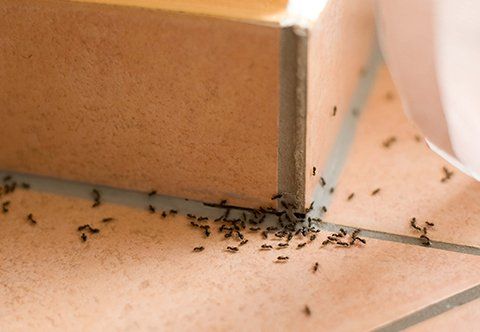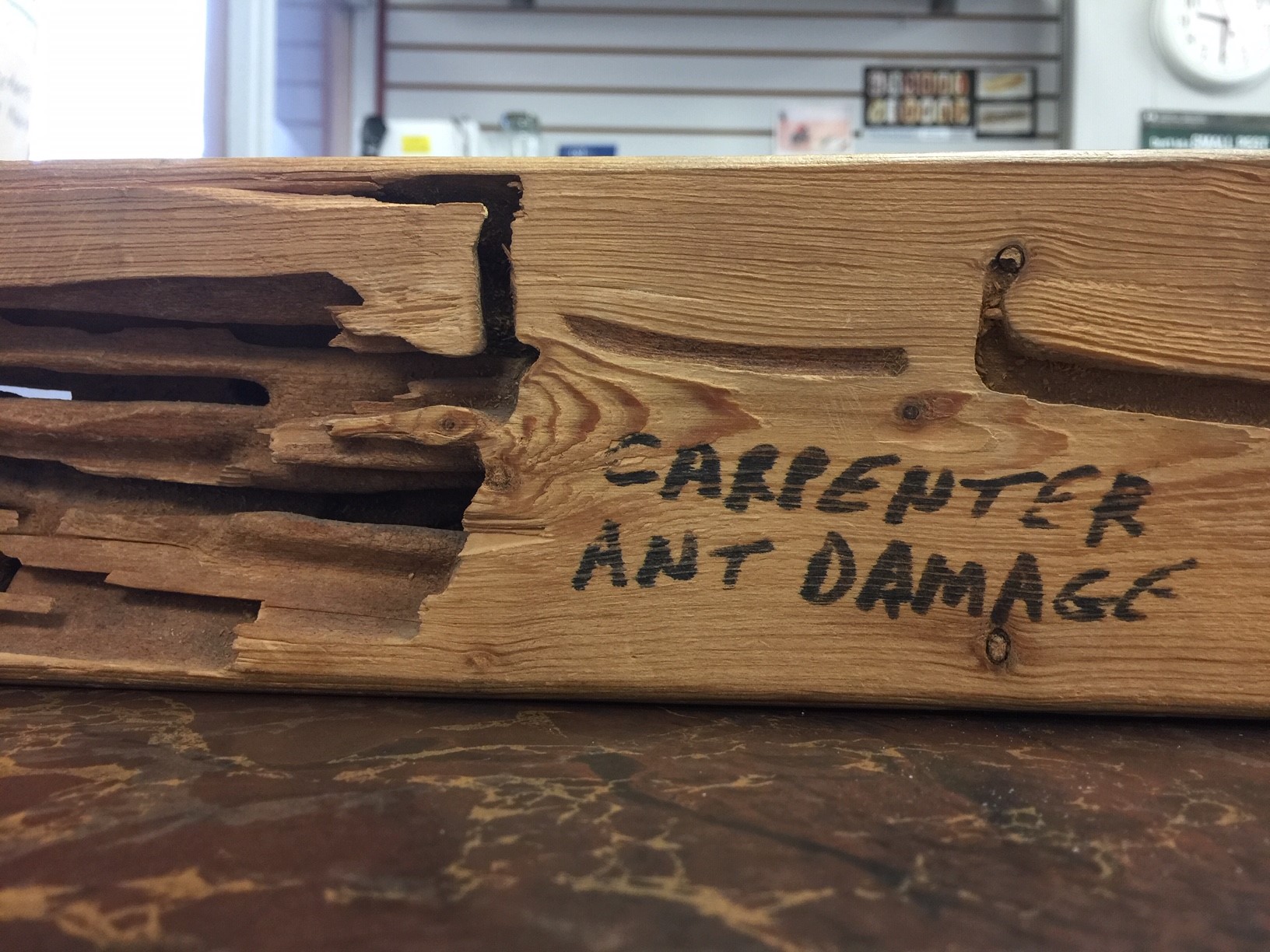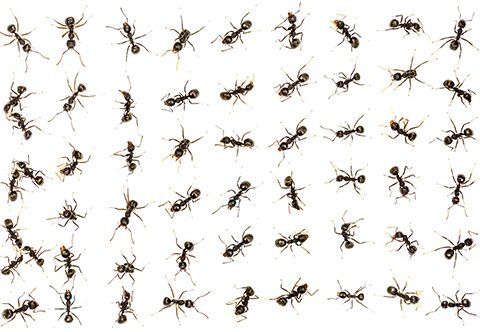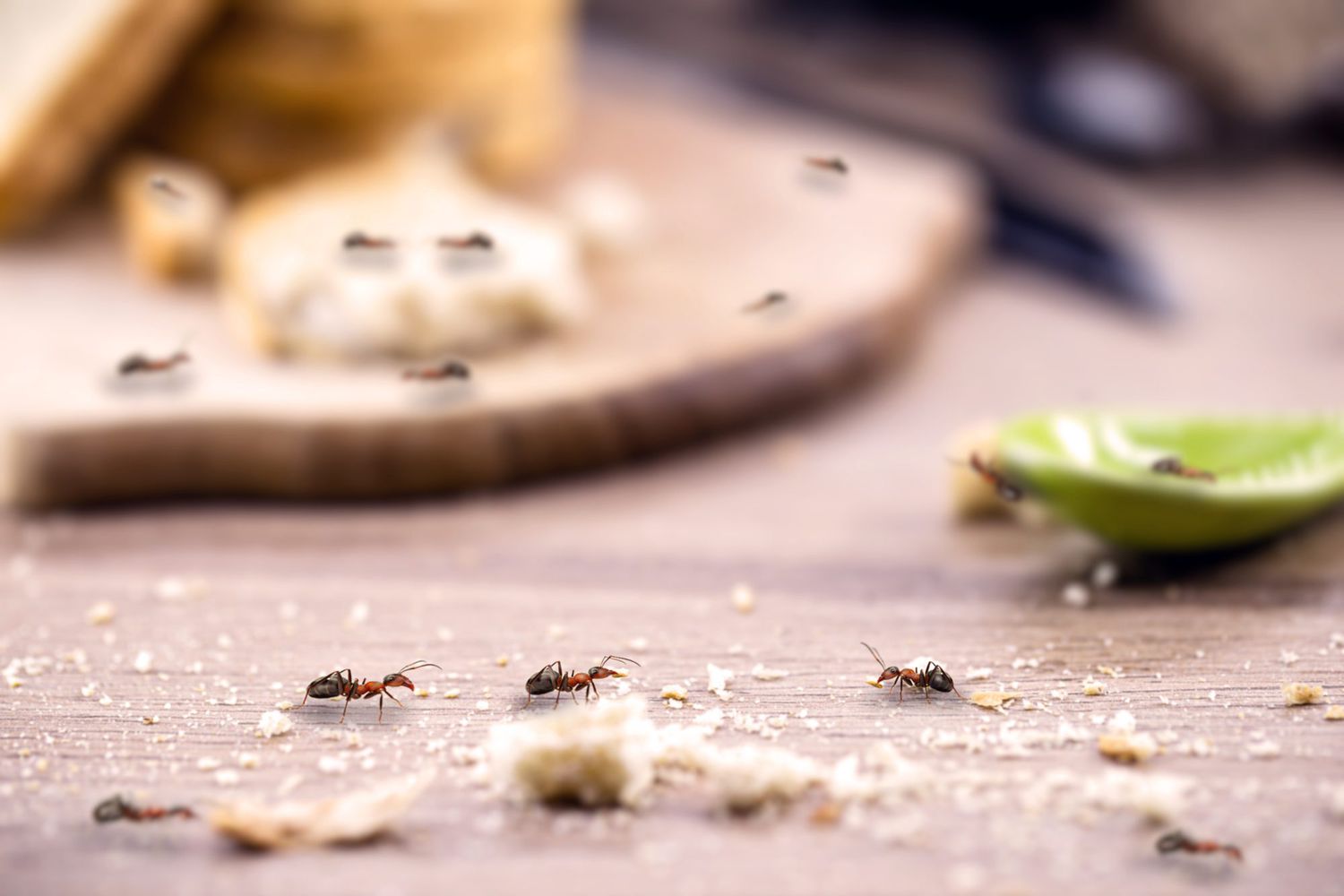Yes, ants can cause damage to your house, primarily through their nest-building activities. Structural damage can occur if infestations remain unchecked.
Ant invasions in homes are a common concern for homeowners. These tiny insects can undermine the integrity of your property by excavating wood and insulation to construct their nests. Over time, large colonies, particularly those of carpenter ants, can weaken the wooden elements of a structure.
This creates a silent yet persistent threat to your home’s stability. Addressing an ant infestation promptly is essential for maintaining the safety and durability of your residence. Regular inspections can identify the early signs of ant activity, preventing extensive damage and costly repairs. Understanding the impact of an ant infestation plays a crucial role in preserving the value and comfort of your living space.
The Hidden Strength Of Ants
Ants may seem small and insignificant. Yet, their strength and organization can worry any homeowner. These tiny insects can secretly build extensive and harmful structures. Their nests stay out of sight as they tirelessly work. Soon, critical damage may surface around your house due to their presence. Learn about the hidden power these small creatures hold and the potential they have to affect your home’s integrity.
Small Size, Big Impact
Ants exemplify the saying “Looks can be deceiving.”. With their miniature size, they can infiltrate homes unnoticed. Each member of their colonies contributes, causing extensive damage over time. For instance, carpenter ants chew through wood, creating tunnels and nests. This weakens timber and can compromise the structure of a house.
- Discreet destruction: Ants work out of sight, beneath the surface.
- Persistent workers: They do not rest, causing continuous damage.
- Carpenter ant specifics: Prefer moist wood, potentially due to leaks or poor ventilation.
Ants Vs. Human Constructions
Ants, with their complex social structures, can stand up against human-made constructions. They adapt to virtually any environment and exploit cracks, crevices, or any small openings in a building. Their nest excavation can destabilize a home’s foundation, leading to costly repairs.
| Ant Activity | Possible Damage |
|---|---|
| Soil Excavation | Foundation Weakness |
| Electrical Interference | Short Circuits |
| Wood Tunneling | Structural Compromise |
Ant colonies can grow quickly. Their efficiency and strength should not be underestimated. Homeowners should stay vigilant and seek professional assistance at signs of ant-related wear.
Ant Species Known For Property Damage
When it comes to household pests, ants frequently top the list; not only are they persistent invaders, but some species can also cause significant damage to your home. It’s essential to identify these miniature menaces before they wreak havoc on your property. Let’s delve into the ant varieties that pose a threat to your home’s integrity.
Carpenter Ants: Nature’s Craftsmen
Carpenter ants are renowned for their ability to sculpt wood. These black or red insects don’t eat timber; instead, they tunnel through it to build their nests, creating smooth galleries inside the wood. Over time, their craftsmanship can compromise the wooden structures of a house.
Signs of infestation include sawdust-like wood shavings, rustling noises within walls, and large winged ants emerging from structures. Here are steps to prevent their damage:
- Keep woodpiles away from your house.
- Fix leaks to avoid moist wood.
- Seal entry points such as cracks and crevices.
Other Destructive Ant Varieties
Aside from carpenter ants, other species can pose risks to your home. These invaders often damage electrical wiring or cause other forms of structural harm. Let’s take a closer look at these unwelcome guests:
| Ant Type | Behavior | Impact on Home |
|---|---|---|
| Fire Ants | Nest in soil, aggressive bite | Can damage electrical systems |
| Pavement Ants | Form under sidewalks, patios | Erode sand or gravel supporting foundations |
| Pharaoh Ants | Prefer warm indoor spaces | Can infest insulated areas causing energy loss |
These varieties might seem small, but their potential to harm should not be underestimated. Regular inspections can help detect early signs of infestation, saving your home from unwanted renovations.
How Ants Infiltrate Homes
Discover the stealthy ways that ants enter your home.
Entry Points: A Tiny Gap Is Enough
Ants don’t need much space to sneak into your house.
- Cracks in the foundation
- Gaps around windows and doors
- Holes where wires and pipes enter
- Vents and chimneys with small openings
Even the smallest openings can act as an invitation to these tiny invaders.
The Attraction: What Brings Ants Inside
Ants come inside looking for food and water.
| Food | Water | Shelter |
|---|---|---|
| Sugary spills | Leaky faucets | Wall voids |
| Crumbs | Pet bowls | Cupboards |
| Grease | Potted plants | Under appliances |
Keeping food sealed and areas dry can help deter these pests.
Signs Of Ant Infestation
Ants may seem tiny, but their impact on a house can be more than a nuisance. Knowing the signs of an infestation is key to protecting your home. Let’s explore the red flags that signal ants have invaded your space.
Spotting The Culprits
Visible ants are the most obvious giveaway. A few scouts often mean more are hiding. Look for ant paths, those little highways they use to travel to and from their food source. Check for ants in the kitchen, pantry, and dining areas, as these are prime spots for them to forage.
- Live ants: Spotting multiple ants indicates a larger problem.
- Ant paths: A line of ants marching signifies a trail to a food source.
- Nesting sites: Small piles of dirt or debris can reveal nests.
Tell-tale Damage Indicators
Some species, like carpenter ants, can damage wood. Inspect your home for subtle clues. Soft clicking sounds within walls, hollow-sounding wood, and wood shavings are signs to watch out for. Check areas where wood is moist as ants get attracted to these spots.
| Damage Indicators | Details |
|---|---|
| Frass: | Wood shavings close to baseboards or damp areas. |
| Structural Damage: | Warped doors, windowsills, or hollow wood sounds. |
| Wall Noises: | Clicking sounds from active ant colonies. |
Regularly inspecting your home for these signs can help you catch an ant infestation before it escalates. If you spot any of these indicators, consider contacting a professional to assess and address the issue as soon as possible.
Consequences Of Ignoring Ant Problems
Ants in the house are more than a nuisance. They bring unseen risks. Failing to stop an ant invasion can lead to big problems. Let’s explore what happens if we ignore these tiny intruders.
Structural Risks
Ants can be secret destroyers of our homes. Carpenter ants love wood. They dig through it to build nests. This makes the wood weak. Floors, walls, and ceilings can get damaged.
Pieces of wood destroyed by ants might need replacement. This leads to costly repairs. Regular inspection helps find and stop ant damage early.
Potential Health Hazards
Ants can carry bacteria. They walk on food and surfaces where we eat. This can make us sick. Pharaoh ants, for example, spread harmful germs. Keeping kitchens clean lessens health risks.
Some people are allergic to ant stings. Fire ants sting and cause pain. It can get worse if many ants sting at once. Quick action reduces these health risks.
Stopping ants early keeps the house safe and healthy. Regular checkups and clean habits are key. Doing this prevents costly repairs and protects our well-being.

Credit: www.copelandexterminating.com
Preventive Measures Against Ants
Ants might be tiny, but they can pack a punch when it comes to damaging your home. From gnawing on wood to compromising electrical systems, these little invaders require strong prevention strategies. Let’s get into some effective measures that will help keep ants at bay and protect your house from potential harm.
Sealing Entry Points
Blocking access is a key step in ant prevention. Ants can enter through the smallest cracks, so thorough inspection and maintenance are crucial. Sealant, caulk, and weather stripping are your best friends here. Use them to patch up:
- Window and door frames
- Utility lines entry points
- Cracks in foundations
Regular checks of these areas can save you from a full-blown ant invasion.
Natural Deterrents And Repellents
Nature offers us several ant combatants that are effective yet non-toxic. Common household items can turn into ant-repelling agents:
| Item | Use |
|---|---|
| Vinegar | Wipe down surfaces to erase scent trails |
| Lemon Juice | Apply around entry points as a deterrent |
| Peppermint Oil | Soak cotton balls and place near suspected areas |
| Cinnamon | Line thresholds and windowsills |
Integrating these items into your cleaning routine can create a natural barrier against ants.
Professional Ant Control Solutions
Ants might seem harmless, but they can wreak havoc in your home. These tiny invaders can damage your property. Professional ant control is a smart move. Experts know how to kick ants out for good. Let’s explore professional extermination and how to keep ants away after treatment.
Choosing The Right Extermination Method
Not all ant problems are the same, so the solution shouldn’t be either. Professional exterminators assess the situation first. They look at the ant type, the infestation size, and the damage caused. Here are some methods they might use:
- Baits: These attract ants to carry poison back to their nests.
- Sprays: Effective for immediate results and surface-level control.
- Granules: Granular pesticides work well outdoors to target nests.
- Non-chemical options: Sometimes, simple measures like sealing entry points go a long way.
Choice matters. The right method depends on your specific ant problem.
Aftercare: Maintaining An Ant-free Home
Success in ant control isn’t just about the initial extermination. Aftercare is essential. Follow these tips to keep ants out:
- Clean up food spills right away, especially sweets.
- Seal cracks and crevices where ants can enter.
- Keep food in sealed containers and dispose of garbage regularly.
- Trim plants away from your house as ants use branches to come inside.
Remember, prevention is key. It’s easier to stop ants from entering than to remove them once they’re inside. Professionals might also offer maintenance plans. These plans keep your home ant-free year-round.
Diy Ant Control: Pros And Cons
Dealing with an ant invasion in your home often prompts a DIY approach. Ant control by yourself can be quick and affordable. However, it might not always offer a long-term solution. Before you choose between natural remedies and professional help, consider some key points.
Household Remedies
Using ingredients from your pantry can be effective for immediate ant problems. Here are some common DIY methods:
- Vinegar: Mix equal parts water and vinegar. Spray it where ants march.
- Baking Soda & Sugar: Combine baking soda with sugar. Ants take it back to their nest, reducing the population.
- Lemon Juice: Its acidity disrupts ants’ scent trails. Just apply around entry points.
Using these methods can help deter ants without harsh chemicals. But remember, they work best for smaller infestations.
When To Call The Experts
Professional exterminators should step in for large invasions. They have specialized knowledge and tools to tackle the problem. Call experts if:
| Condition | Action |
|---|---|
| Repeated infestations | Expert assessment |
| Property damage | Professional removal |
| Large colonies | Advanced treatment |
Professional help ensures effective ant eradication and damage control.
Long-term Strategies To Protect Your Home
Ants are tiny, but their impact on your home can be big if not managed. Developing a plan for ant prevention can save you from costly repairs in the future. Let’s explore how regular maintenance and smart landscaping can form a shield around your sanctuary.
Regular Inspections
Checking your home routinely is key in identifying early signs of an ant infestation. Here’s a brief checklist for these inspections:
- Scan the foundation for any cracks where ants might enter.
- Examine windows and doors for tiny gaps.
- Look for moisture issues around pipes and in the basement.
- Check your kitchen and pantry for any food spills.
Biannual inspections can prevent an ant problem from going unnoticed. Specialists are best for these tasks as they spot things that you might miss.
Landscaping To Deter Ants
Your yard can help in the fight against ants. Strategic landscaping tips include:
- Trim branches that touch the house, creating bridges for ants.
- Maintain a 12-inch clear boundary between soil or mulch and your home’s siding. This avoids giving ants easy access.
- Choose plants that repel ants, like peppermint and lavender.
- Ensure your irrigation system doesn’t flood the foundation.
Bear in mind, a well-maintained garden is your first defense. An expert landscaper can also provide valuable insights into keeping ants at bay.

Credit: poulins.ca
Ecological Impact Of Ant Infestations
Imagine ants swarming through your home. Ants can be more than just a nuisance. They can harm your house. Yet, they play a role in our environment. It’s vital to understand this balance.
Ants In The Ecosystem
Ants are crucial in nature. They aerate soil and help decompose organic matter. They can also control other pests. But inside a house, they may cause trouble.
- Aerating Soil: Ants tunnel through the ground, allowing water and air to reach plant roots.
- Decomposing Organic Matter: As cleaners, ants break down dead insects and animals.
- Controlling Pests: Ants eat eggs and larvae of harmful insects, making gardens healthier.
Balancing Control And Conservation
Keeping ants out of homes is essential. But we must not harm their outdoor role.
Here are ways to balance control with conservation:
- Identify Entry Points: Seal cracks and gaps where ants enter homes.
- Use Natural Repellents: Peppermint oil and vinegar can deter ants without environmental harm.
- Professional Help: Experts can manage infestations with minimal ecological impact.

Credit: www.copelandexterminating.com
Frequently Asked Questions For Can Ants Cause Damage To Your House
Can Ants Structurally Damage Your Home?
Yes, certain ant species, like carpenter ants, can cause structural damage to homes. They excavate wood to create nesting sites, potentially compromising the integrity of wooden elements within your house’s structure.
How Do You Detect Ant Damage In Houses?
Look for signs like small piles of wood shavings, faint rustling noises within walls, or the presence of large, winged ants. These indicators suggest the presence of carpenter ants and potential damage.
What Attracts Ants Into Your Home?
Ants are often attracted by food remnants, sugary spills, and moisture. Crumbs, pet food, and overripe fruit left out can invite ants indoors. Addressing spills and practicing cleanliness are essential prevention steps.
Are Ants A Serious Problem For Homeowners?
Yes, while most ants are nuisance pests, some species, such as carpenter ants, can pose a serious problem by damaging home structures. Prompt control measures are crucial to prevent significant harm.
Are there different types of ants that can cause structural damage to a house?
Yes, there are different types of ants that can cause structural damage to a house. Carpenter ants and termites are the most common culprits. They can weaken the wood in your home, leading to costly repairs. It’s important to address an ant infestation promptly to prevent further structural damage.
Conclusion
Ants can surprisingly undermine your home’s integrity, despite their tiny size. Acting swiftly can prevent significant structural harm and avoid costly repairs. Maintaining cleanliness and addressing nests early is key. Remember, a vigilant homeowner can prevent these minuscule architects from becoming big-time saboteurs.
Don’t let ants chip away at your peaceful abode.
{ “@context”: “https://schema.org”, “@type”: “FAQPage”, “mainEntity”: [ { “@type”: “Question”, “name”: “Can ants structurally damage your home?”, “acceptedAnswer”: { “@type”: “Answer”, “text”: “Yes, certain ant species, like carpenter ants, can cause structural damage to homes. They excavate wood to create nesting sites, potentially compromising the integrity of wooden elements within your house’s structure.” } } , { “@type”: “Question”, “name”: “How do you detect ant damage in houses?”, “acceptedAnswer”: { “@type”: “Answer”, “text”: “Look for signs like small piles of wood shavings, faint rustling noises within walls, or the presence of large, winged ants. These indicators suggest the presence of carpenter ants and potential damage.” } } , { “@type”: “Question”, “name”: “What attracts ants into your home?”, “acceptedAnswer”: { “@type”: “Answer”, “text”: “Ants are often attracted by food remnants, sugary spills, and moisture. Crumbs, pet food, and overripe fruit left out can invite ants indoors. Addressing spills and practicing cleanliness are essential prevention steps.” } } , { “@type”: “Question”, “name”: “Are ants a serious problem for homeowners?”, “acceptedAnswer”: { “@type”: “Answer”, “text”: “Yes, while most ants are nuisance pests, some species, such as carpenter ants, can pose a serious problem by damaging home structures. Prompt control measures are crucial to prevent significant harm.” } } ] }
I’m MD Tanvir, and I bring years of expertise gained from working closely with pest control companies to the forefront. My journey in the industry has inspired me to launch Bug Battler, a platform aimed at equipping people with the know-how to combat pests autonomously. Through Bug Battler, I aim to empower individuals with practical insights to tackle pest infestations effectively.

